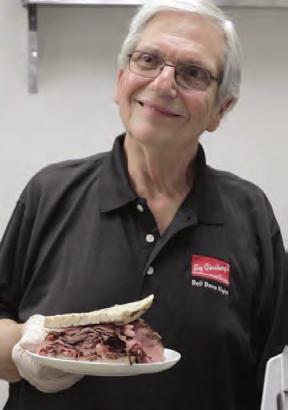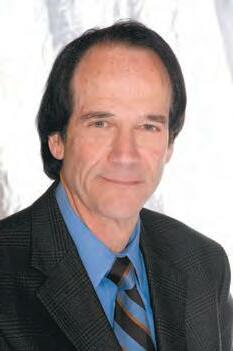
3 minute read
Torah portion
Smith 74th
Arthur and Dotty Smith of West Bloomfield celebrated their 74th wedding anniversary on Jan. 27, 2022. The couple met at a Hillel dance after which Arthur had his more outspoken but similar sounding brother arrange their first date. Arthur served as a communications officer in the Navy in WW II, completed his college education at Wayne State University and worked as a CPA and entrepreneur. Dotty got her teaching degree and taught special education for 30 years. They had two children and have four grandchildren. They describe raising their children as their golden years. The couple enjoy reading, travel adventures, and sharing closeness and love with friends and family.
Advertisement
Sokol-Daien
Mara and Gary Daien of Livonia are thrilled to announce the engagement of their daughter Rachel Elizabeth Daien to Barry Samuel Sokol, son of Michele and Dan Sokol of Dayton, Ohio. Barry surprised Rachel with a romantic November 2021 engagement in Fort Lauderdale, FL.
Rachel is an elementary school counselor and former middle school teacher for Plymouth-Canton Community Schools. She graduated with a B.S. in elementary education from Eastern Michigan University, earned her M.A. in teaching from Marygrove College and graduated with an M.A. in counseling from Eastern Michigan University. She is also a National Certified Counselor (NCC) and Licensed Professional Counselor (LPC) for the state of Michigan.
Barry is a mathematics and social studies teacher formerly of the Columbus, Ohio, area. He received his B.S. and M.Ed. in education from Ohio State University, with a specialization in middle grades. Barry previously coached seventh-grade boys basketball and is passionate about sports.
The couple reside in Commerce Township. They are excited to celebrate their May 2022 wedding with family and friends in Novi. A Hawaiian island-hopping honeymoon is planned for June.
SPIRIT
TORAH PORTION
Developing Relationships
About 2,000 years ago, when the Temple in Jerusalem was destroyed, the concept of having a synagogue in every neighborhood was a brilliant innovation that has since been duplicated by religions all over the world.
In this week’s Torah portion, we read one of its longest narratives. It discusses the construction of a temporary temple to be used by the Jewish nation while journeying through the desert. The Torah usually reveals vast amounts of details in a concise manner leaving it to the Talmud to elaborate on the specifics.
The laws of kosher, Shabbat, mezuzah, tefillin and holidays are all taught with just a few verses or several words. Conversely, the construction of the temporary temple is a glaring exception to the normal brevity. The question is, why this exception, particularly for a mitzvah that was only relevant for a brief period?
The fact that the Torah dedicates so many chapters to the laws of this temporary structure indicates that it wishes to emphasize a point. Although throughout much of Jewish history we would be bereft of our Temple, it should never be forsaken as its lessons will remain central to the Jewish practice for eternity.
The Temple’s main service was the sacrifices. The Hebrew word is korban, more accurately translated “coming close” from the Hebrew word karov. The synagogue, which serves as a
substitute for the Temple until it is rebuilt, is a place to work on our relationship to come closer to the Creator, the Controller of the world. This relationship ultimately defines all other relationships in our lives. The greatest love in the world is that of a parent for a child. This type of love is greater because of the selfless devotion a parent Rabbi Tzali pours into their child.
Freedman As physical beings, we could not have a relation-
Parshat ship strictly based on an Tetzaveh: Exodus 27:20-30:10; emotional level that only utilized our hearts. We
Ezekiel needed the physical service 43:10-27. in the Temple, today represented by our service in the synagogue, as a place to develop our souls, analogous to going to the gym to develop our bodies. This week’s portion discusses the korban tamid, the sacrifice brought in the morning and the afternoon. It was exactly the same twice every single day because service does not necessarily have to be innovative. Greatness often comes from repetitive efforts. All relationships, whether with humans or our Creator, benefit from devotion that is both disciplined and consistent. This is the reason why we have services in our synagogues twice daily. There, in this sanctified space, we are able to express our allegiance and ensure that our personal relationship with the Creator of the universe remains constant, meaningful and robust. Rabbi Tzali Freedman is regional director of Central East NCSY in Southfield.










